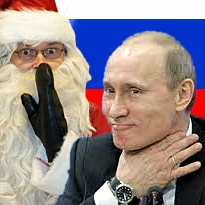 What the hell is going on in Russia? Just last month, the country’s Supreme Court threatened internet service providers with a one-way trip to Chechnya if they permitted Russians to access online gambling sites or even sites talking about online gambling. Next on Russia’s list of things not to talk about on the internet? Santa Claus, or ‘Grandfather Frost’ as he’s known locally. In a conversation with news agency Interfax, Russia’s chief medical officer Gennady Onishchenko bemoaned the fact that the age by which Russian kids stop believing in the fat guy in the red suit (no, not Kruschev) has fallen to “a catastrophically low level … Thanks to information technology, children who have yet to learn to speak are already questioning the beautiful fairytale.” Hey, you know what would help reverse this trend? Public officials not telling internet news outlets that Santa Claus is a fairytale.
What the hell is going on in Russia? Just last month, the country’s Supreme Court threatened internet service providers with a one-way trip to Chechnya if they permitted Russians to access online gambling sites or even sites talking about online gambling. Next on Russia’s list of things not to talk about on the internet? Santa Claus, or ‘Grandfather Frost’ as he’s known locally. In a conversation with news agency Interfax, Russia’s chief medical officer Gennady Onishchenko bemoaned the fact that the age by which Russian kids stop believing in the fat guy in the red suit (no, not Kruschev) has fallen to “a catastrophically low level … Thanks to information technology, children who have yet to learn to speak are already questioning the beautiful fairytale.” Hey, you know what would help reverse this trend? Public officials not telling internet news outlets that Santa Claus is a fairytale.
Ever since Russia restricted casino gambling to four nearly inaccessible geographic ghettos, the nation has been plagued/blessed by the rise of thousands of illegal gaming joints, some of which enjoy cozy relationships with top government officials. Russian legal information agency RAPSI reports that Denis Sugrobov, who heads the Interior Ministry’s Economic Security and Anti-Corruption Department, recently informed a State Duma roundtable that there were as many as 50k of the illegal casinos currently in operation. Sugrobov suggests it’s not enough to lock up the gambling den’s organizers, so he has proposed “introducing administrative liability for gamblers and for those who let premises” to the organizers. We’re pretty sure ‘administrative liability’ in Russia amounts to having icicles inserted into your ears.
Not to be outdone, the Economy Ministry has released a statement proposing that the federal government become the sole body authorized to operate lotteries. The government presently operates three national lotteries, but Bloomberg quoted Economy Ministry estimates that a lottery monopoly would add 10b rubles ($324m) per year in extra revenue to the government’s coffers. Business newspaper Vedomosti says Russia has issued 4,000 lottery licenses since 2005, most of which are “extremely non-transparent” about how they distribute proceeds to the social causes they’re supposedly set up to benefit. Unlike the government-run lotteries, which make it crystal clear that proceeds are distributed to the Vladmir Putin Friends & Oligarchs Benevolent Fund.